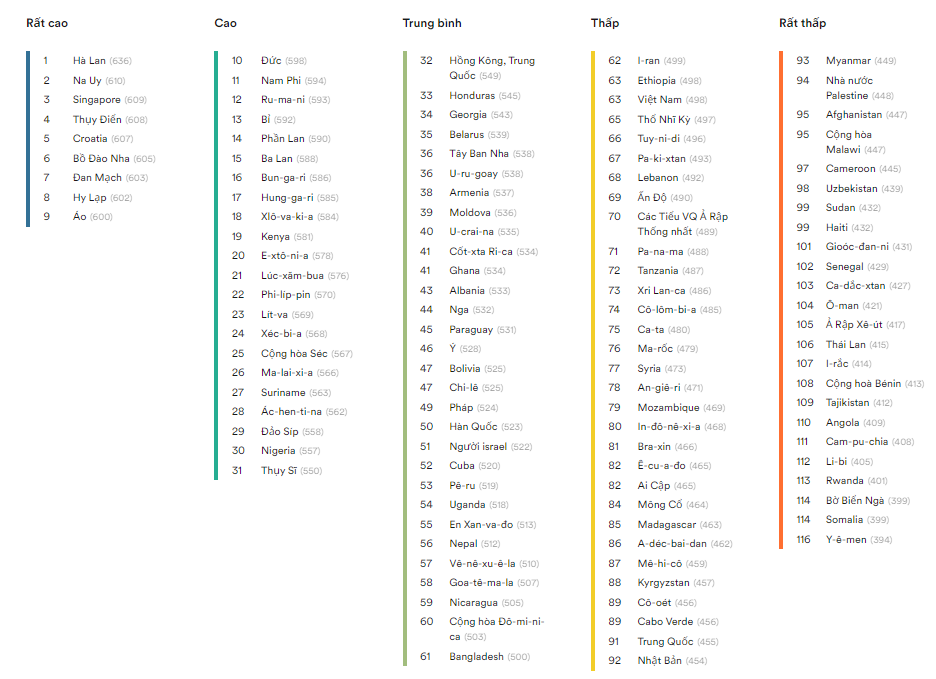Vietnam's EPI English Proficiency Index in 2024 decreased compared to 2023, leading to a drop in the rankings.

An English enhancement class for students at Ho Van Hue Primary School (Phu Nhuan District, Ho Chi Minh City) - Photo: NHU HUNG
On November 13, Education First officially announced the 2024 Global English Proficiency Index (EPI 2024).
The survey has been conducted annually since 2011 and is currently the world's largest survey of English language skills by country and region.
The 2024 EPI is based on test results from 2.1 million non-native English speakers aged 18 and over in 116 countries and regions.
Based on the EPI results, countries will be divided into English proficiency groups: Very high (over 600 points), High (550 - 599 points), Medium (500 - 549 points), Low (450 - 499 points), Very low (below 450 points).
In 2024, the English proficiency index of Vietnamese people reached 498 points, in the low group. A year ago, in 2023, Vietnam reached 505 points, in the average group.
In this year's global rankings, Vietnam ranked 63rd out of 116 countries and regions.
Thus, Vietnam's 2024 ranking has dropped 5 places compared to a year earlier, from 58 to 63, giving this position to Guatemala, a Spanish-speaking country in Central America.
This ranking is also quite far from the best ranking Vietnam achieved in 2019, 52nd.
In Asia, Vietnam ranks 8th in English proficiency, after Singapore, Philippines, Malaysia, Hong Kong, South Korea, Nepal and Bangladesh.
Compared to 2023, Vietnam dropped one place from 7th to 8th. Bangladesh took over Vietnam's 7th place, while last year it was ranked 8th.
Vietnam ranks above some countries in the region such as Indonesia (80), China (91) and Japan (92) in the EPI 2024 index.

EPI Ranking 2024, Netherlands continues to be the leading country - Photo: EF
Mr. Mark Do, director of EF Education First in Vietnam, said that EF analyzed that global English proficiency is declining. This year is the fourth consecutive year that global English proficiency has declined, with 60% of the countries in the ranking having lower scores than last year.
However, a bright spot is that the 18-20 age group has halted its long-term decline, increasing by 5 points compared to 2023 after falling 89 points since 2015.
Asia saw the biggest drop in English proficiency compared to last year, largely due to India and partly due to China. In Europe, English proficiency also fell slightly.
In Latin America, English proficiency remained stable after years of increases, but some countries such as Brazil, El Salvador and Cuba dropped more than 10 points.
Another EF analysis shows that there are still 40 countries where men significantly outperform women, by more than 20 points, similar to 2023.
Notably, Africa is the only continent where women consistently outperform men in English, and it is also the region where women have improved most significantly.
How is the English Proficiency Index (EPI) calculated?
EF EPI country scores are calculated as a three-year average. First, EF calculates the average EF SET scores of all test takers in a country in the previous calendar year.
This score is then averaged with the published EF EPI scores from the previous two years (Y-1 and Y-2). This method makes the index more stable and reduces fluctuations due to year-to-year sample changes.
After calculating the EF EPI country scores, EF uses these scores to calculate composite scores for world regions (e.g. Europe, Asia) and a global score.
These scores are weighted according to the population of each country. For example, India's score will be weighted more than Thailand's when calculating the Asia region score.
This method applies to all scores at the supranational level (global and regional scores, along with breakdowns by gender and age group).
Subgroup scores within a country are not weighted by population but are calculated as three-year averages, adjusted against the national score to ensure consistency.
Based on threshold scores, EF ranks countries, regions and cities into proficiency groups, helping to identify clusters of similar English skill levels and compare these subjects within and across regions.
Source: https://tuoitre.vn/chi-so-thong-thao-tieng-anh-viet-nam-dung-thu-63-trong-116-quoc-gia-khao-sat-20241113071558073.htm


![[Photo] Prime Minister Pham Minh Chinh receives Swedish Minister of International Development Cooperation and Foreign Trade](https://vphoto.vietnam.vn/thumb/1200x675/vietnam/resource/IMAGE/2025/5/12/ae50d0bb57584fd1bbe1cd77d9ad6d97)


![[Photo] Prime Minister Pham Minh Chinh works with the Standing Committee of Thai Binh Provincial Party Committee](https://vphoto.vietnam.vn/thumb/1200x675/vietnam/resource/IMAGE/2025/5/12/f514ab990c544e05a446f77bba59c7d1)

![[Photo] Prime Minister Pham Minh Chinh starts construction of vital highway through Thai Binh and Nam Dinh](https://vphoto.vietnam.vn/thumb/1200x675/vietnam/resource/IMAGE/2025/5/12/52d98584ccea4c8dbf7c7f7484433af5)

























































































Comment (0)